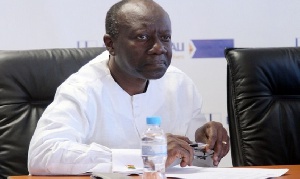The Minister of Finance Ken Ofori-Atta has given the strongest assurance that the Akufo-Addo-led government is fixing an “inherited economy with a budget deficit of 9%.”
According to him, the deficit means a primary balance which was negative, which meant Ghana had to borrow to pay her debts; GH¢10 billion in interest payments each year; high rates of inflation; and GH¢7 billion of “hidden” arrears.
However, he said the new government has put in place measures to fix and restore confidence in the country’s economy.
He noted that, between the cost of labour, interest payments and statutory fees, these amounted to 107% of Ghana’s revenue, “so obviously we were not going to do much.”
This, he indicated, led to the appointment of a new Commissioner of the Ghana Revenue Authority to bring dynamism in the collection of revenue; examining of government expenditure; and the capping of statutory funds to 25% of government revenue.
“That immediately freed up fiscal space for our programmes, as well as providing the stimulus package for the struggling businesses. We abolished a lot of taxes for people from Abossey Okai to the Stock Exchange, so people can feel energised and get into self-employment,” he added.
Re-profiling Debt
“What do you do when you inherit an economy with $30 billion of debt, paying GH¢10 billion every year in interest payments, and in every three months, you go into the market to get money meant for the private sector to pay interest on your debt and wages and salaries of workers?” Ken Ofori-Atta quizzed.
This situation led to the managers of the economy deciding to re-profile Ghana’s debt, according to Ken Ofori-Atta.
“Reprofiling means that instead of these debts maturing every 90 days, let us find a way to increase the tenure of maturity so that instead of the 91 days and 5 years, we move it to 15 years. It gives us some breathing room to enable us to do what we need to do to revive the economy,” he explained.
Ken Ofori-Atta was confident of the measures put in place by government will result in reducing the budget deficit from 9% to 6.5%; increase growth rates from 3.6%, the lowest in 22 years, to 6.3% at the end of 2017.
“The primary balance will be positive, which means we will not borrow to pay our debts. Things have stabilised, interest rates are coming down, but there is still a lot of work to be done,” he said.
General News of Monday, 12 June 2017
Source: dailyguideafrica.com

















